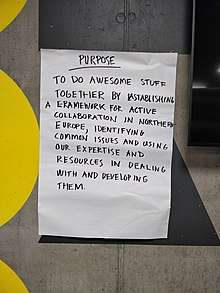purpose
English
Pronunciation
- (General American) IPA(key): /ˈpɝpəs/
- (Received Pronunciation) IPA(key): /ˈpɜːpəs/
- Rhymes: -ɜː(ɹ)pəs
Audio (US) (file)
Etymology 1
From Middle English purpos, from Old French purposer (“to propose”), from Latin prō (“forth”) + pono, hence Latin propono, proponere, with conjugation altered based on poser.
Noun
purpose (countable and uncountable, plural purposes)
- An object to be reached; a target; an aim; a goal.
 "purpose".
"purpose".- 2013 June 7, Ed Pilkington, “‘Killer robots’ should be banned in advance, UN told”, in The Guardian Weekly, volume 188, number 26, page 6:
- In his submission to the UN, [Christof] Heyns points to the experience of drones. Unmanned aerial vehicles were intended initially only for surveillance, and their use for offensive purposes was prohibited, yet once strategists realised their perceived advantages as a means of carrying out targeted killings, all objections were swept out of the way.
-
- A result that is desired; an intention.
- The act of intending to do something; resolution; determination.
- 2013, Phil McNulty, "", BBC Sport, 1 September 2013:
- United began with more purpose in the early phase of the second half and Liverpool were grateful for Glen Johnson's crucial block from Young's goalbound shot.
- 2013 July-August, Sarah Glaz, “Ode to Prime Numbers”, in American Scientist, volume 101, number 4:
- Some poems, echoing the purpose of early poetic treatises on scientific principles, attempt to elucidate the mathematical concepts that underlie prime numbers. Others play with primes’ cultural associations. Still others derive their structure from mathematical patterns involving primes.
- 2013, Phil McNulty, "", BBC Sport, 1 September 2013:
- The subject of discourse; the point at issue.
- (Can we find and add a quotation of Spenser to this entry?)
- The reason for which something is done, or the reason it is done in a particular way.
- The purpose of turning off the lights overnight is to save energy.
- (obsolete) Instance; example.
- (Can we date this quote by Roger L'Estrange?), Fables of Æsop and Other Eminent Mythologists.
- 'Tis a common Thing for Captious People, and Double-Dealers, to be taken in their Own Snares ; as for the Purpose in the Matter of Power.
- (Can we date this quote by Roger L'Estrange?), Fables of Æsop and Other Eminent Mythologists.
Synonyms
- (target): aim, goal, object, target; See also Thesaurus:goal
- (intention): aim, plan, intention; See also Thesaurus:intention
- (determination): determination, intention, resolution
- (subject of discourse): matter, subject, topic
- (reason for doing something): reason
Hyponyms
Derived terms
Related terms
Translations
target
|
|
intention
|
|
determination
|
subject of discourse
reason for doing something
|
- The translations below need to be checked and inserted above into the appropriate translation tables, removing any numbers. Numbers do not necessarily match those in definitions. See instructions at Wiktionary:Entry layout#Translations.
Etymology 2
From Middle English purposen, from Old French purposer (“to propose”)
Verb
purpose (third-person singular simple present purposes, present participle purposing, simple past and past participle purposed)
- (intransitive) To have set as one's purpose; resolve to accomplish; intend; plan.
- Macaulay
- I purpose to write the history of England from the accession of King James the Second down to a time which is within the memory of men still living.
- Macaulay
- (transitive, passive) To design for some purpose. (Can we add an example for this sense?)
- (obsolete, intransitive) To discourse.
- (Can we find and add a quotation of Edmund Spenser to this entry?)
Derived terms
Synonyms
Translations
have set as one's purpose; intend
passive: design for some purpose
|
References
- “purpose” in Dictionary.com Unabridged, Dictionary.com, LLC, 1995–present.
- “purpose” in The American Heritage Dictionary of the English Language, 4th edition, Boston, Mass.: Houghton Mifflin, 2000, →ISBN.
- "purpose" in WordNet 2.0, Princeton University, 2003.
This article is issued from
Wiktionary.
The text is licensed under Creative
Commons - Attribution - Sharealike.
Additional terms may apply for the media files.